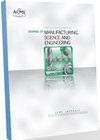SENSOR-BASED PLANNING AND CONTROL FOR CONFORMAL DEPOSITION ON A DEFORMABLE SURFACE USING AN ARTICULATED INDUSTRIAL ROBOT
IF 2.9
3区 工程技术
Q3 ENGINEERING, MANUFACTURING
Journal of Manufacturing Science and Engineering-transactions of The Asme
Pub Date : 2023-10-19
DOI:10.1115/1.4063560
引用次数: 0
Abstract
Abstract Robotic manipulators can be used to deposit materials on non-planar surfaces. Conventional sensor-based industrial robots can only work on stationary surfaces, relying on the scanned data prior to printing. As a result, performing depositions that involve changes in plane motion presents significant challenges. The deposition of conformal materials on a time-varying deformable surface requires the manipulators to update coordinates in real time on the plane for positioning and orientation. This can be achieved by employing multiple sensors for manipulator motion planning and control, in order to prevent collisions between the tool and the surface. In this paper, we propose simple tool center point calibration, initial point coordinate estimation, and a gap compensation scheme to combine real-time feedback control and direct conformal deposition. Combining these elements allows us to maintain a controlled gap between the tooltip and the deformable surface during the deposition. We test the efficacy of the proposed approach by printing a single layer of ink patterns with approximately 950 μm line width on a deformable surface. We also characterize the printing quality with different gaps and printing steps and show that sensor-based control is critical in smooth printing. Finally, the effects of changing the relative position of the tooltip, different surface colors, and laser sensor position are characterized.基于传感器的可变形表面保形沉积规划与控制的关节式工业机器人
机器人机械手可以用于在非平面表面上沉积材料。传统的基于传感器的工业机器人只能在固定的表面上工作,依赖于打印前的扫描数据。因此,进行涉及平面运动变化的沉积提出了重大挑战。保形材料在时变变形表面上的沉积需要机器人实时更新平面上的坐标来进行定位和定向。这可以通过采用多个传感器进行机械手运动规划和控制来实现,以防止工具与表面之间的碰撞。本文提出了一种结合实时反馈控制和直接保形沉积的简单刀具中心点标定、初始点坐标估计和间隙补偿方案。结合这些元素,我们可以在沉积过程中保持工具提示和可变形表面之间的可控间隙。我们通过在可变形表面上打印约950 μm线宽的单层油墨图案来测试所提出方法的有效性。我们还描述了不同间隙和印刷步骤的印刷质量,并表明基于传感器的控制对于顺利印刷至关重要。最后,分析了改变工具提示的相对位置、不同表面颜色和激光传感器位置的效果。
本文章由计算机程序翻译,如有差异,请以英文原文为准。
求助全文
约1分钟内获得全文
求助全文
来源期刊
CiteScore
6.80
自引率
20.00%
发文量
126
审稿时长
12 months
期刊介绍:
Areas of interest including, but not limited to: Additive manufacturing; Advanced materials and processing; Assembly; Biomedical manufacturing; Bulk deformation processes (e.g., extrusion, forging, wire drawing, etc.); CAD/CAM/CAE; Computer-integrated manufacturing; Control and automation; Cyber-physical systems in manufacturing; Data science-enhanced manufacturing; Design for manufacturing; Electrical and electrochemical machining; Grinding and abrasive processes; Injection molding and other polymer fabrication processes; Inspection and quality control; Laser processes; Machine tool dynamics; Machining processes; Materials handling; Metrology; Micro- and nano-machining and processing; Modeling and simulation; Nontraditional manufacturing processes; Plant engineering and maintenance; Powder processing; Precision and ultra-precision machining; Process engineering; Process planning; Production systems optimization; Rapid prototyping and solid freeform fabrication; Robotics and flexible tooling; Sensing, monitoring, and diagnostics; Sheet and tube metal forming; Sustainable manufacturing; Tribology in manufacturing; Welding and joining

 求助内容:
求助内容: 应助结果提醒方式:
应助结果提醒方式:


